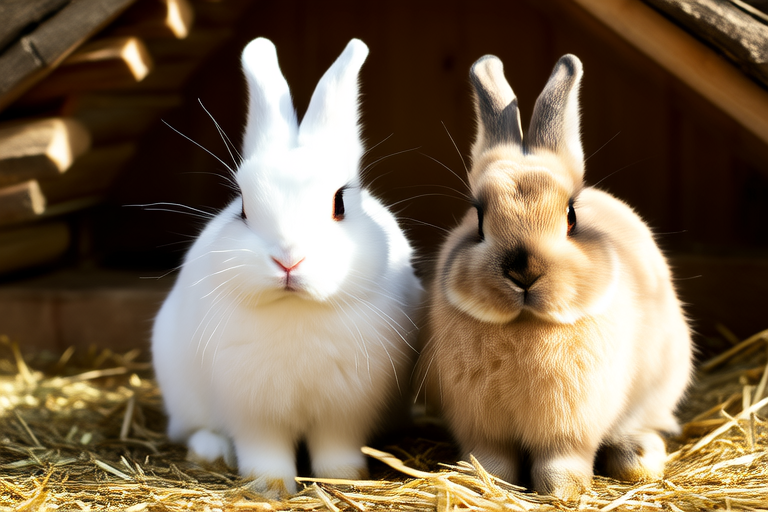Dutch Dwarf Rabbits: The Ultimate Guide for First-Time Bunny Owners
Introduction to Dutch Dwarf Rabbits
Dutch Dwarf rabbits are one of the most popular breeds among rabbit enthusiasts. Originating from the Netherlands, these compact rabbits are known for their distinct coloration and friendly nature. They have been bred for centuries to be ideal pets, making them perfect for first-time owners. With their small size, they require less space and are easier to handle than larger breeds.
Characteristics and Temperament
Dutch Dwarfs are characterized by their compact size, typically weighing between 1.8 to 2.3 kg (4 to 5 lbs). Their short, dense fur comes in a variety of colors, including black, blue, chocolate, and white. One of their most distinguishing features is the presence of a contrasting color on their face, chest, and feet, which adds to their charm. These rabbits are generally docile and gentle, making them excellent companions for children. They are curious and playful, often engaging with their environment through exploration and interaction.
Housing Requirements and Setup
Proper housing is crucial for the health and happiness of your Dutch Dwarf. A spacious hutch or cage should provide ample room for movement, ideally at least 2 square feet per rabbit. Ensure the enclosure has adequate ventilation and protection from extreme weather conditions. Adding a litter box with appropriate bedding, such as straw or wood shavings, helps maintain cleanliness. Providing toys and tunnels encourages exercise and mental stimulation. Regular cleaning of the living area prevents the buildup of bacteria and odor.
Diet and Nutrition Specifics
A balanced diet is essential for the well-being of your Dutch Dwarf. The primary component of their diet should be hay, which aids digestion and dental health. Fresh vegetables, such as carrots, spinach, and broccoli, can be offered in moderation. Avoid feeding them foods high in sugar or starch, like fruits or grains. Timothy pellets formulated for dwarf rabbits can also be provided but should not replace hay. Always ensure access to clean, fresh water.
Grooming and Hygiene Tips
Grooming your Dutch Dwarf regularly keeps them healthy and comfortable. Brush their coat weekly to remove loose fur and prevent matting. Check their nails monthly and trim them if necessary to avoid overgrowth. Clean their ears gently with a damp cloth to prevent wax buildup. Pay attention to their teeth, as overgrown incisors can lead to serious health issues. Regular brushing also helps distribute natural oils, maintaining a shiny coat.
Health Concerns and Care
Common health issues in Dutch Dwarfs include dental problems, respiratory infections, and digestive disorders. Regular veterinary check-ups are vital for early detection and treatment of these conditions. Signs of illness may include lethargy, loss of appetite, or changes in bathroom habits. Prompt action can prevent minor issues from becoming severe. Maintaining a clean living environment and a balanced diet contributes significantly to their overall health.
Training and Socialization Techniques
Dutch Dwarfs can be trained to use a litter box and respond to basic commands. Positive reinforcement, such as treats and praise, encourages good behavior. Socializing them from an early age helps them become comfortable around people and other animals. Spend time interacting with your rabbit daily to build trust and strengthen your bond. Providing safe areas for exploration and play fosters confidence and reduces anxiety.
Tips for First-Time Owners
Before bringing home a Dutch Dwarf, research thoroughly about their needs and care requirements. Prepare your home by setting up a suitable living space and gathering necessary supplies. Choose a reputable breeder or shelter to adopt from. Be patient as you learn about your new pet’s habits and preferences. Seek advice from experienced owners or veterinarians when needed. Enjoy the journey of building a rewarding relationship with your bunny companion.
Common Mistakes to Avoid
First-time owners might unintentionally make mistakes that could affect their rabbit’s health and happiness. Some common pitfalls include inadequate housing, improper diet, lack of exercise, and insufficient socialization. Overfeeding treats or inappropriate foods can lead to obesity and related health problems. Neglecting grooming needs can cause discomfort and skin issues. Always prioritize your rabbit’s well-being by providing proper care and attention.
Resources for Further Learning
To deepen your knowledge about Dutch Dwarf rabbits, consider reading books, joining online forums, and attending local rabbit clubs. Books like “The Rabbit Care Manual” by Marylou Zarbock offer comprehensive guides on rabbit care. Websites dedicated to rabbit welfare provide valuable information and support. Engaging with communities of fellow rabbit owners allows you to share experiences and gain insights. Continuous learning ensures you provide the best possible care for your pet.
